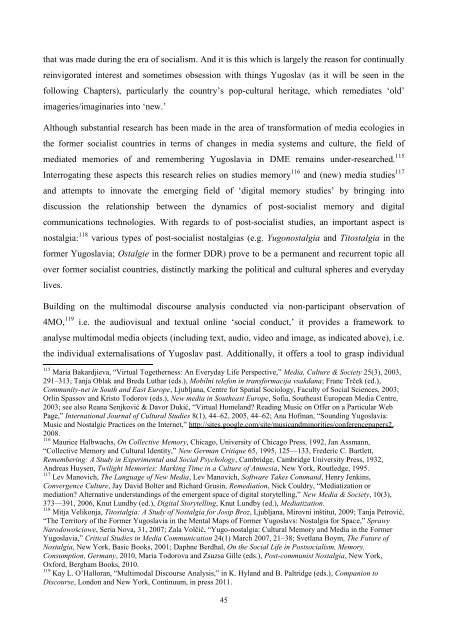UNIVERSITY OF NOVA GORICA GRADUATE SCHOOL ...
UNIVERSITY OF NOVA GORICA GRADUATE SCHOOL ...
UNIVERSITY OF NOVA GORICA GRADUATE SCHOOL ...
Create successful ePaper yourself
Turn your PDF publications into a flip-book with our unique Google optimized e-Paper software.
that was made during the era of socialism. And it is this which is largely the reason for continually<br />
reinvigorated interest and sometimes obsession with things Yugoslav (as it will be seen in the<br />
following Chapters), particularly the country‘s pop-cultural heritage, which remediates ‗old‘<br />
imageries/imaginaries into ‗new.‘<br />
Although substantial research has been made in the area of transformation of media ecologies in<br />
the former socialist countries in terms of changes in media systems and culture, the field of<br />
mediated memories of and remembering Yugoslavia in DME remains under-researched. 115<br />
Interrogating these aspects this research relies on studies memory 116 and (new) media studies 117<br />
and attempts to innovate the emerging field of ‗digital memory studies‘ by bringing into<br />
discussion the relationship between the dynamics of post-socialist memory and digital<br />
communications technologies. With regards to of post-socialist studies, an important aspect is<br />
nostalgia: 118 various types of post-socialist nostalgias (e.g. Yugonostalgia and Titostalgia in the<br />
former Yugoslavia; Ostalgie in the former DDR) prove to be a permanent and recurrent topic all<br />
over former socialist countries, distinctly marking the political and cultural spheres and everyday<br />
lives.<br />
Building on the multimodal discourse analysis conducted via non-participant observation of<br />
4MO, 119<br />
i.e. the audiovisual and textual online ‗social conduct,‘ it provides a framework to<br />
analyse multimodal media objects (including text, audio, video and image, as indicated above), i.e.<br />
the individual externalisations of Yugoslav past. Additionally, it offers a tool to grasp individual<br />
115 Maria Bakardjieva, ―Virtual Togetherness: An Everyday Life Perspective,‖ Media, Culture & Society 25(3), 2003,<br />
291–313; Tanja Oblak and Breda Luthar (eds.), Mobilni telefon in transformacija vsakdana; Franc Trĉek (ed.),<br />
Community-net in South and East Europe, Ljubljana, Centre for Spatial Sociology, Faculty of Social Sciences, 2003;<br />
Orlin Spassov and Kristo Todorov (eds.), New media in Southeast Europe, Sofia, Southeast European Media Centre,<br />
2003; see also Reana Senjković & Davor Dukić, ―Virtual Homeland? Reading Music on Offer on a Particular Web<br />
Page,‖ International Journal of Cultural Studies 8(1), 44–62, 2005, 44–62; Ana Hofman, ―Sounding Yugoslavia:<br />
Music and Nostalgic Practices on the Internet,‖ http://sites.google.com/site/musicandminorities/conferencepapers2,<br />
2008.<br />
116 Maurice Halbwachs, On Collective Memory, Chicago, University of Chicago Press, 1992, Jan Assmann,<br />
―Collective Memory and Cultural Identity,‖ New German Critique 65, 1995, 125—133, Frederic C. Bartlett,<br />
Remembering: A Study in Experimental and Social Psychology, Cambridge, Cambridge University Press, 1932,<br />
Andreas Huysen, Twilight Memories: Marking Time in a Culture of Amnesia, New York, Routledge, 1995.<br />
117 Lev Manovich, The Language of New Media, Lev Manovich, Software Takes Command, Henry Jenkins,<br />
Convergence Culture, Jay David Bolter and Richard Grusin, Remediation, Nick Couldry, ―Mediatization or<br />
mediation? Alternative understandings of the emergent space of digital storytelling,‖ New Media & Society, 10(3),<br />
373—391, 2006, Knut Lundby (ed.), Digital Storytelling, Knut Lundby (ed.), Mediatization.<br />
118 Mitja Velikonja, Titostalgia: A Study of Nostalgia for Josip Broz, Ljubljana, Mirovni inštitut, 2009; Tanja Petrović,<br />
―The Territory of the Former Yugoslavia in the Mental Maps of Former Yugoslavs: Nostalgia for Space,‖ Sprawy<br />
Narodowościowe, Seria Nova, 31, 2007; Zala Volĉiĉ, ―Yugo-nostalgia: Cultural Memory and Media in the Former<br />
Yugoslavia,‖ Critical Studies in Media Communication 24(1) March 2007, 21–38; Svetlana Boym, The Future of<br />
Nostalgia, New York, Basic Books, 2001; Daphne Berdhal, On the Social Life in Postsocialism, Memory,<br />
Consumption, Germany, 2010, Maria Todorova and Zsuzsa Gille (eds.), Post-communist Nostalgia, New York,<br />
Oxford, Bergham Books, 2010.<br />
119 Kay L. O‘Halloran, ―Multimodal Discourse Analysis,‖ in K. Hyland and B. Paltridge (eds.), Companion to<br />
Discourse, London and New York, Continuum, in press 2011.<br />
45

















